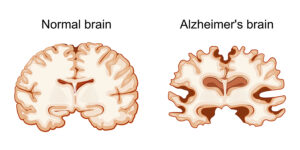Dr. James LaValle discussed a new Alzheimer’s treatment at the Anti-Aging Conference in Las Vegas, which I attended. He was one of the keynote speakers Dec. 13, 2024. He has a PhD in Pharmacy and has given many lectures at these yearly Anti-Aging Conferences before. His talk was entitled “Galectin-3: the potential target to reverse decline of all dementias”.
Galectin-3 associated with acute and chronic inflammation
Galectin-3 is released whenever there is acute or chronic inflammation present. It is a protein that plays a role in many biological functions and is a potential biomarker for a number of diseases. Diseases like heart disease, kidney disease, neurodegenerative diseases and cancer are all associated with galectin-3 production. There is an increase of galectin-3 blood levels with diabetes and obesity. When the hemoglobin A1C level is elevated due to diabetes, galectin-3 levels are also increased. The same is true for high fasting plasma glucose levels and high hs CRP (high sensitivity C-reactive protein), a measure of body inflammation.
Key points
Dr. LaValle pointed out that a doubling of galectin-3 levels in the blood over 6 months identifies a high-risk patient.
Laboratory findings:
- Levels < 17.8 ng/ml – low risk of adverse outcomes
- 8 – 22.2 ng/ml – moderate risk of adverse outcomes
- >22.2 ng/ml = high risk of adverse outcomes
- Levels of Gal-3 > 25.9 predict patients likely to rapidly progress to heart failureWith respect to Alzheimer’s disease a 2024 study showed that galectin-3 stimulates the supportive connective tissue in the brain to cause Alzheimer’s disease. Inflammation sets in causing tau protein deposits and accumulation of amyloid beta plaques.
A 2020 study on 513 participants showed an interesting observation:
- When both tau and amyloid pathology was present, 27% of the patients had Alzheimer’s disease
- Patients with only amyloid pathology had only 6% Alzheimer’s disease
- Also, patients with high galectin-3 levels in the blood were likely to have Alzheimer’s disease
Galectin-3 inhibitors
Researchers are conducting a clinical trial where they test the effectiveness of a galectin-3 inhibitor with regard to Alzheimer’s disease. As it is a clinical trial, there is no pharmaceutical name for the pharmacological substance. It goes by the tentatively name of TB006.
Here is a summary of the clinical trial:
“TrueBinding developed TB006 as a treatment for neurodegenerative disorders like Alzheimer’s disease. Clinical trials for TB006 have shown:
-
Safety
TB006 is generally safe and well tolerated, with the most common side effect being infusion-related reactions.
-
Efficacy
Researchers noted that TB006 can slow or reverse the progression of Alzheimer’s disease:
- In a Phase 2a trial, TB006 improved cognitive function as measured by the Mini-Mental State Examination (MMSE) by day 36.
- In the same trial, TB006 reduced blood levels of amyloid-beta-42, a toxic protein that clumps in the brains of Alzheimer’s patients.
- In a Phase 1/2 trial, TB006 produced a 63% reduction in worsening on the Clinical Dementia Rating-Sum of Boxes (CDR-SB) at three months compared to placebo.
-
Cost
TB006 is estimated to cost between $8,500 and $20,600 annually, which is more affordable than Aduhelm, a similar drug that costs $56,000 per year. TB006 is also being studied for its potential to treat autism spectrum disorder.”
This website contains a superb video explaining that TB006 is a monoclonal antibody that binds to galectin-3. This prevents further deterioration of the Alzheimer patient as both tau and amyloid proteins undergo inactivation and destruction. At the same time neurological connections regenerate and patients recover from Alzheimer’s.
After completion of the phase 2 clinical trial researchers start a much larger phase 3 clinical trial. After this the FDA will approve this new drug. This could take another 2 or 3 years to complete.
Conclusion
Galectin-3 is a glue-like protein, which tissues with inflammation release. This is true for the brain of patients with Alzheimer’s disease. It is also true when major organs develop chronic inflammation like the liver, the heart, lungs and kidneys. Here the discussion centers around Alzheimer’s disease because the California company TrueBinding has developed a specific monoclonal antibody medication to treat Alzheimer’s. It will be cheaper than Aduhelm, a similar drug. The experimental drug is termed TB006, but will eventually get a proper pharmacological name when phase 3 of the clinical trial is complete. This will take another 2 to 3 years. TB006 produced a 63% reduction in worsening on the Clinical Dementia Rating-Sum of Boxes (CDR-SB) at three months compared to placebo.







